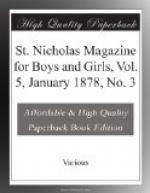[Illustration: By the sad sea waves.]
UNDER THE LILACS.
By Louisa M. Alcott.
CHAPTER XXI.
CUPID’S last appearance.
A picnic supper on the grass followed the games, and then, as twilight began to fall, the young people were marshaled to the coach-house, now transformed into a rustic theater. One big door was open, and seats, arranged lengthwise, faced the red table-cloths which formed the curtain. A row of lamps made very good foot-lights, and an invisible band performed a Wagner-like overture on combs, tin trumpets, drums, and pipes, with an accompaniment of suppressed laughter.
Many of the children had never seen anything like it, and sat staring about them in mute admiration and expectancy; but the older ones criticised freely, and indulged in wild speculations as to the meaning of various convulsions of nature going on behind the curtain.
While Teacher was dressing the actresses for the tragedy, Miss Celia and Thorny, who were old hands at this sort of amusement, gave a “Potato” pantomime as a side show.
Across an empty stall a green cloth was fastened, so high that the heads of the operators were not seen. A little curtain flew up, disclosing the front of a Chinese pagoda painted on pasteboard, with a door and window which opened quite naturally. This stood on one side, several green trees with paper lanterns hanging from the boughs were on the other side, and the words “Tea Garden,” printed over the top, showed the nature of this charming spot.
Few of the children had ever seen the immortal Punch and Judy, so this was a most agreeable novelty, and before they could make out what it meant, a voice began to sing, so distinctly that every word was heard:
“In China there lived a little
man,
His name was Chingery Wangery
Chan.”
Here the hero “took the stage” with great dignity, clad in a loose yellow jacket over a blue skirt, which concealed the hand that made his body. A pointed hat adorned his head, and on removing this to bow he disclosed a bald pate with a black queue in the middle, and a Chinese face nicely painted on the potato, the lower part of which was hollowed out to fit Thorny’s first finger, while his thumb and second finger were in the sleeves of the yellow jacket, making a lively pair of arms. While he saluted, the song went on:
“His legs were short, his
feet were small,
And this little man could
not walk at all.”
Which assertion was proved to be false by the agility with which the “little man” danced a jig in time to the rollicking chorus:
“Chingery changery ri co day,
Ekel tekel happy man;
Uron odesko canty oh, oh,
Gallopy wallopy China go.”




